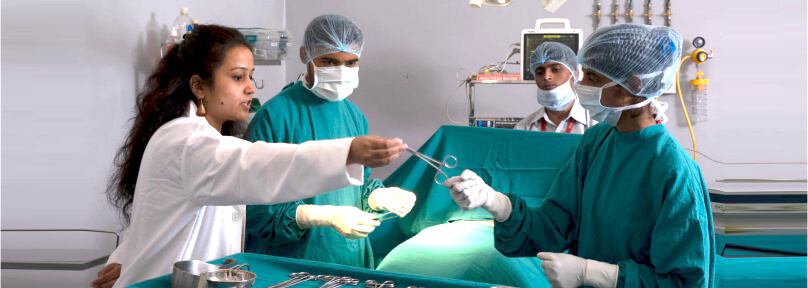Operation Theatre (OT) is a department of the hospital where wonders happen. However, to make such wonders, one must make sure to follow the right procedure and guidelines learnt during his academic training. An OT team comprises of surgeons, anaesthetists, scrub nurse, circulating nurse, assisting surgeons, OT technicians and other assisting paramedical staff. So, if you’ve completed your training in Operation Theatre Technician course, and you’re ready to become a part of the OT team, then you must make sure to understand and follow some of the operation room etiquette.
It is obvious for a fresher to feel the anxiety and nervousness while entering the Operation Theatre for the first time, but all you need is to remember your training and coordinate with your team.
Operation Theatre Etiquette
For beginners, the operating room is always an uncharted territory where a novice is unaware of the various rules and processes. Therefore, we provide you with some basic Operation Theatre etiquette –
- Have a good meal before entering the OT and empty your bladder. Some surgeries might go on for longer duration
- Switch off your phones or keep them in silent mode
- Remove your jewellery
- Make sure you go through the patient’s medical records and about the surgery beforehand
- Wear the OT gears (clean scrub with theatre shoes, cap and mask) before you enter the operating room
- Also, your identification card must be visible to everyone
- Introduce yourself to the OT supervisor, the main surgeon, the anaesthetist and all present. They are your actual mentors at that particular time
- Confirm the Patient Identity before shifting Patient to OT
- Cross verify if the Procedural consent is signed before patient shifting
- Ensure Patient dentures or movable artificial teeth are removed before shifting the patient
- Mark the surgical side and site before Patient shifting
What to do inside the Operation Theatre?
If you’re fresher and it is your first time inside the operation room, then first, you must make sure that you are not nervous and remember your training to give you confidence. Of course, you’ve taken tips and advice from your seniors before entering the OT, but here are some tips for you from our experts of Tech Mahindra SMART Academy for Healthcare on what you can do inside the operating room –
- Make yourself as useful as possible. Help transfer the patient from the bed to the operating table
- Offer to assist in the pre-operative procedures, complete the documentation, provide an appropriate position to the patient as instructed by the surgeon
- Always ask if you can scrub up for a case as hands-on experience is very necessary
- Before you scrub, apply your mask and safety goggles, if required. Then open a sterile gown pack and gloves of the right size. Check the expiry date on the packet to avoid allergic reactions. Do the same for your seniors
- Once scrubbed, clasp your hands together at the level of your chest, if you are standing away from the sterile surgical field. This will prevent you from becoming contaminated
- If on the other hand, you are standing near the OT table, you can place your hands flat in the sterile area. Do not break the sterility of the operative field as it can cause several infections to the patient postoperatively
- Keep the operating field unobstructed. You can assist in passing swabs, perform suctioning when required. Don’t forget to count the number of swabs before passing it on to the surgical field. Also, your role as a human retractor may be called on
- Don’t take anything personally, keep it professional, as there can be any unpleasant reaction by any of the member presents in an OT due to any high-stress situation
- During the surgery, do not touch any article on the instrument trolley. Ask and wait to be handed over an instrument by the working staff
- When the surgeon starts suturing, take the initiative and have scissors ready in hand to cut ends of the suture
- Remember to return all instruments once you have finished
- After the operation, de-scrub efficiently and assist wherever required
- If you get a needle stick injury, inform the team immediately
- If you feel dizzy, do not be embarrassed to admit this and excuse yourself. If it is too late, step backwards to avoid contaminating the operative field. Maintain the sanctity of the sterile field
- Theatre is a fun learning experience, so if you have any questions, then just ask at the right time and refrain from hesitation
Join Tech Mahindra SMART Academy’s Operation Theatre Technician Course
At Tech Mahindra SMART Academy for Healthcare, you can join our Operation Theatre Technician course and become a skilled healthcare professional in just 2 years. Our Diploma program will include practical as well as on-the-job training to help you understand the work environment. Also, on completion of your course, our placement team will assist you to get a job in renowned hospitals.
The essential role of an Operation Theatre Technician is to prepare the operating room for surgery and assist the surgeon during surgery. They are solely responsible for setting of the instrument trolleys, positioning the operation table and patient. Apart from this, they are also required to autoclave and prepare the sterile supplies for use in the operation theatre.
With the increase in demand of healthcare professionals across the world, opting for a career in healthcare is a smart option. Today, our SMART Academies have a placement rate of over 70% and our students are placed across the nation in reputed healthcare institutes. If you like this blog, then do share it with your friends who want to become a healthcare professional.




